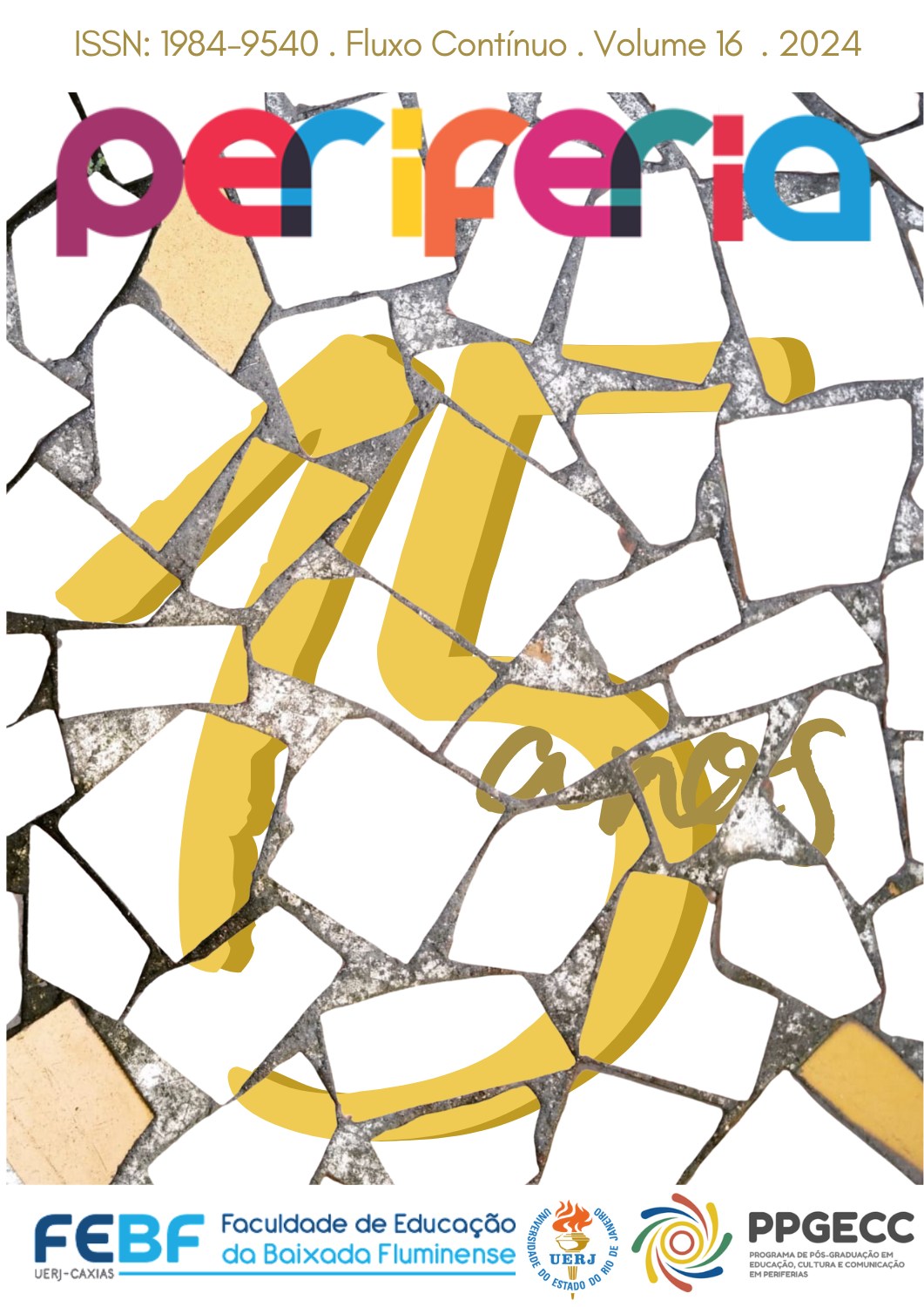OS SABERES E A IDENTIDADE DOCENTE DE PROFESSORES ATUANTES NA EDUCAÇÃO BÁSICA
DOI:
https://doi.org/10.12957/periferia.2024.78202Palavras-chave:
Saberes docentes, Identidade Docente, Educação Básica, Estado do Conhecimento.Resumo
O texto aborda discussões inerentes aos saberes da docência e à construção da identidade docente de professores atuantes na educação básica. O objetivo é de apresentar um mapeamento, por meio da realização do Estado do Conhecimento, de pesquisas que versam sobre os saberes e a identidade docente de professores atuantes na educação básica. Trata-se de uma pesquisa, com abordagem qualitativa, cujo delineamento é bibliográfico. Nos resultados, além do montante de produções emergentes da pesquisa, destaca-se a escolha de quatro dissertações, que delinearam seu objeto principal de estudo, a figura do professor. Os objetivos das pesquisas selecionadas permeiam ações de analisar a construção dos saberes, da identidade docente, da alteridade, haja vista cada qual analisados nas diversas etapas da educação básica. Contudo, vale destacar a pesquisa a campo, no “chão” da escola, juntamente aos professores, o quanto ela é válida e possibilita questões para análise. Conclui-se sobre a construção do estado do conhecimento que permite ampliar os olhares e as percepções diante dos trabalhos acadêmicos publicados, dentre teses e dissertações, afim de identificar as pesquisas já realizadas. Enquanto que, sobre os saberes e a identidade docente, conclui-se que não são imutáveis, fixos e tampouco aplicáveis de uma realidade a outra, sendo construídos e reconstruídos ao longo do exercício da profissão docente, conforme o contexto espaço-temporal em que se desenvolve a docência.
Referências
AGUERRONDO, Inês. Formação docente na sociedade do conhecimento. Estudos em Avaliação Educacional, 2009, p. 363-387.
CANÁRIO, Rui. A escola: o lugar onde os professores aprendem. Revista de Psicologia, São Paulo: PUC/SP, 1998, v. 6, 1º semestre, p. 9-27.
CAPES. Catálogo de Teses e Dissertações. Disponível em: <http://catalogodeteses.capes.gov.br/catalogo-teses/#!/>. Acesso em: 02 dez. 2022.
CORREIA, Heloisa Helena Ferreira. Escola: espaço de construção da docência. 2017. Dissertação (Mestrado em Educação) – Universidade de Taubaté, Taubaté, 2017.
DUBAR, Claude. A socialização: construção das identidades sociais e profissionais. Tradução de Andréa Stahel M. da Silva. São Paulo: Martins Fontes, 2005.
FREIRE, Paulo. Pedagogia da autonomia: saberes necessários à prática educativa. São Paulo: Paz e Terra, 1996.
GARCIA, Carlos Marcelo. Formação de professores: para uma mudança educativa. Porto, Portugal: Porto Editora, 1999.
GARCIA, Carlos Marcelo. Formação de professores: novas perspectivas baseadas na investigação sobre o pensamento do professor. In: NÓVOA, Antônio (Org.). Os professores e a sua formação. Portugal: Dom Quixote, 1992, p. 52-75.
GIL, Antonio Carlos. Como elaborar projetos de pesquisa. 5. ed. São Paulo: Atlas, 2010.
IMBERNÓN, Francisco. Formação continuada dos professores. São Paulo: Artmed, 2010.
LAURENTI, Carolina; BARROS, Mari Nilza Ferrari de. Identidade: questões conceituais e contextos. Identidade, ISSN: 1516-4888, v. 2, n. 1, jun. 2000.
MENDES, Cristiane Rodrigues. Saberes que constituem a identidade docente na educação infantil: perspectiva de professoras da rede pública de Dom Aquino/MT. 2021. Dissertação (Mestrado em Educação) – Universidade Regional Integrada do Alto Uruguai e das Missões, Frederico Westphalen, 2021.
MOROSINI, Marília Costa; FERNANDES, Cleoni Maria Barboza. Estado do conhecimento: conceitos, finalidades e interlocuções. Disponível em: <https://revistaseletronicas.pucrs.br/ojs/index.php/porescrito/article/download/18875/12399/>. Acesso em: 26 set. 2022.
NÓVOA, António. Profissão professor. 2. ed. Coleção Ciências da Educação. Porto, Portugal: Porto Editora, 1999.
NÓVOA, António; ALVIM, Iara. Escolas e professores: proteger, transformar, valorizar. Salvador: SEC/IAT, 2022.
RAMPAZZO, Sônia Elisete; CORRÊA, Fernanda Zanin Mota. Desmistificando a metodologia científica: guia prática de produção de trabalhos acadêmicos. Erechim: Habilis, 2008.
RODRIGUES, Rosenilma Branco; COUTO, Hergos Ritor Fróes de. Educação e prática docente: o lugar do corpo na aprendizagem de alunos na região amazônica. Revista Periferia, v. 15, p. 1-26, 2023, e74893.
ROLDÃO, Maria do Céu Neves. Que é ser professor hoje? A profissionalidade docente revisitada. Revista da ESES, v. 9, Nova Série, 1998, p. 79-87.
SANTOS, Kátia Maria Limeira. Alteridade na construção da identidade docente: um estudo de caso em escolas localizadas em áreas rurais do município de Propriá (SE). 2017. Dissertação (Mestrado em Educação) – Universidade Tiradentes, Aracaju, 2017.
SOARES, Silvia Barreto. A constituição da prática pedagógica dos professores iniciantes da educação básica. 2020. Dissertação (Mestrado em Educação) – Universidade Federal do Rio Grande, Rio Grande, 2020.
STRIEDER, Roque. Educação e humanização: por uma vivência criativa. Florianópolis: Habitus, 2002.
TARDIF, Maurice. Os professores diante do saber: esboço de uma problemática do saber docente. In: TARDIF, Maurice. Saberes docentes e formação profissional. 17. ed. Petrópolis: Vozes, 2014. p. 31-55.
TARDIF, Maurice. Saberes docentes e formação profissional. Petrópolis: Editora Vozes, 2002.
VEIGA, Ilma Passos Alenxastro; D’ÁVILA, Cristina Maria (Orgs.). Profissão docente: novos sentidos, novas perspectivas. 2. ed. Campinas: Papirus, 2012.
Downloads
Publicado
Como Citar
Edição
Seção
Licença
Autores que publicam nesta revista concordam com os seguintes termos:- Autores mantém os direitos autorais e concedem à revista o direito de primeira publicação, com o trabalho simultaneamente licenciado sob a Creative Commons Attribution License que permitindo o compartilhamento do trabalho com reconhecimento da autoria do trabalho e publicação inicial nesta revista.
- Autores têm autorização para assumir contratos adicionais separadamente, para distribuição não-exclusiva da versão do trabalho publicada nesta revista (ex.: publicar em repositório institucional ou como capítulo de livro), com reconhecimento de autoria e publicação inicial nesta revista.
- Autores têm permissão e são estimulados a publicar e distribuir seu trabalho online (ex.: em repositórios institucionais ou na sua página pessoal) a qualquer ponto antes ou durante o processo editorial, já que isso pode gerar alterações produtivas, bem como aumentar o impacto e a citação do trabalho publicado (Veja O Efeito do Acesso Livre).







